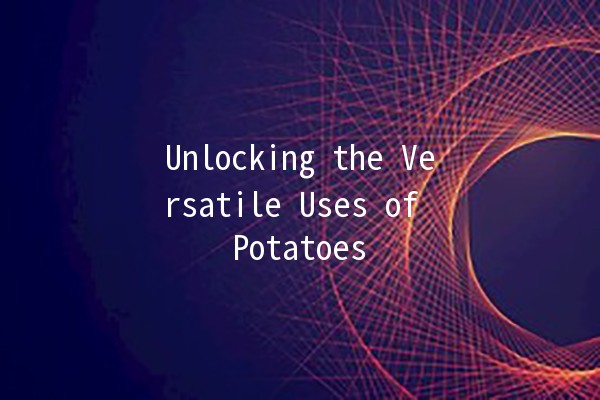Potatoes are one of the most versatile foods available, offering a world of possibilities in the kitchen. Not only are they nutritious and filling, but they can also be transformed into a myriad of delicious dishes. This article will explore practical and creative ways to use potatoes, providing productivityenhancing techniques to make the most out of this humble vegetable.
Understanding the Nutritional Value of Potatoes
Before diving into the various uses of potatoes, it's important to recognize their nutritional benefits. A mediumsized potato has:
Calories: Approximately 130
Carbohydrates: 30 grams
Protein: 3 grams

Fiber: 2 grams
Vitamin C: 30% of the Recommended Daily Value (DV)
Potatoes are also a good source of potassium, essential for heart health. Knowing this, we can harness the power of potatoes in different recipes and meal planning strategies.
Practical Ways to Use Potatoes
Description: Mashed potatoes are a classic side dish, but they can be greatly enhanced with added flavors and ingredients.
How to Enhance:
Add Roasted Garlic: Roast garlic cloves until golden and mix them into your mashed potatoes for a deeper flavor.
Cream Cheese or Sour Cream: These can add creaminess and tanginess, elevating the dish.
Herbs and Spices: Incorporate fresh herbs like chives, parsley, or spices like paprika for an extra kick.
Application Example: Serve garlic mashed potatoes alongside grilled meats or as a base for savory mushroom gravy. This elevates your meals and impresses dinner guests.
Description: Baked potato wedges are a healthier alternative to fries and are perfect for meal prep.
How to Prepare:
Cut the Potatoes: Slice into wedges, leaving the skin on for added texture and nutrients.
Seasoning: Toss with olive oil, salt, pepper, paprika, and oregano.
Bake: Spread on a baking sheet and roast at 425°F (220°C) for about 3035 minutes, flipping halfway through.
Application Example: Bake a batch at the beginning of the week and pair these wedges with various proteins such as chicken, fish, or beans throughout the week to create balanced meals effortlessly.
Description: Traditional potato salads can be high in calories due to heavy dressings. A lighter version can be just as satisfying.
How to Make a Healthier Potato Salad:
Use Vinaigrette Instead of Mayo: Combine olive oil, vinegar, mustard, and herbs as a dressing.
Add Vegetables: Incorporate peas, bell peppers, or green beans for crunch and nutrition.
Protein Boost: Mix in chopped eggs or beans for added protein.
Application Example: Serve this potato salad at barbecues or potlucks, offering a refreshing and nutritious option that everyone can enjoy.
Description: Baked potatoes can be topped with numerous ingredients, making them perfect for personalizing meals.
How to Prepare:
Choose Your Potato: Russets are ideal due to their fluffy texture.
Bake: Prick potatoes with a fork and wrap in foil. Bake at 400°F (200°C) for about 4560 minutes.
Top Creatively:
Classic: Butter, salt, and pepper.
Healthy: Greek yogurt, chives, and shredded cheese.
Hearty: Chili and cheese for a comforting meal.
Application Example: Set up a baked potato bar during gatherings, allowing guests to customize their potatoes with various toppings. This interactive approach not only engages people but also caters to different dietary preferences.
Description: A hearty potato soup can be both comforting and nutritious, perfect for colder months.
How to Prepare:
Base Ingredients: Start with onions, celery, and carrots sautéed in butter until soft.
Add Potatoes: Diced potatoes should be added with vegetable or chicken broth.
Creamy ish: Incorporate milk or cream and blend to desired consistency.
Application Example: Serve with crusty bread to make a filling and balanced meal. This dish can also be made in large batches and frozen for quick weeknight dinners.
Frequently Asked Questions
Different potato types serve various culinary purposes:
Russet Potatoes: Ideal for baking and frying due to their starchy content.
Yukon Gold: Great for mashed potatoes with its buttery texture.
Red Potatoes: Perfect for salads due to their waxiness.
gerling Potatoes: Excellent for roasting and salads, providing a unique appearance.
To store potatoes effectively:
Keep Them in a Cool, Dark Place: A pantry or cellar is ideal.
Avoid Refrigeration: Cold temperatures can turn their starches into sugars, affecting flavor and texture.
Check Regularly: Remove any sprouted or damaged potatoes to prevent spoilage.
Yes, potatoes can be frozen, but it's best to cook them first:
Blanch: Cut into desired sizes and blanch in boiling water for a few minutes.
Cool Quickly: Place them in ice water to stop the cooking process.
Freeze: Pack in airtight containers or bags, and they can be stored for up to a year.
To achieve the perfect texture:
Use the Right Potato: Starchy varieties like Russets are preferred.
Warm Ingredients: Warm the milk or cream before adding it to the potatoes to maintain heat and consistency.
Avoid OverMixing: Mix just until combined to prevent them from becoming gummy.
Potatoes are rich in vitamins and minerals, including vitamin C, potassium, and B vitamins. They provide energy through carbohydrates and are filling, which can help with portion control. When prepared healthily, they can fit into a balanced diet.
Leftover potatoes can be repurposed in various dishes:
Hash: Chop leftover potatoes and sauté with onions and peppers for a delicious breakfast hash.
Cakes or Fritters: Combine mashed potatoes with eggs and flour to make patties, then panfry until golden.
Soups and Stews: Add chunks of leftover baked or boiled potatoes to soups for added texture and nutrition.
As we explore the many uses of potatoes, it's clear that this versatile vegetable can enhance our culinary experiences. From simple preparations to elaborate dishes, potatoes can adapt to various cooking styles and dietary needs, making them a staple in any kitchen. Their nutritional benefits and diverse applications ensure they're not just a side dish but a central feature in our meals. Embrace the incredible potential of potatoes, and let them inspire your cooking endeavors!